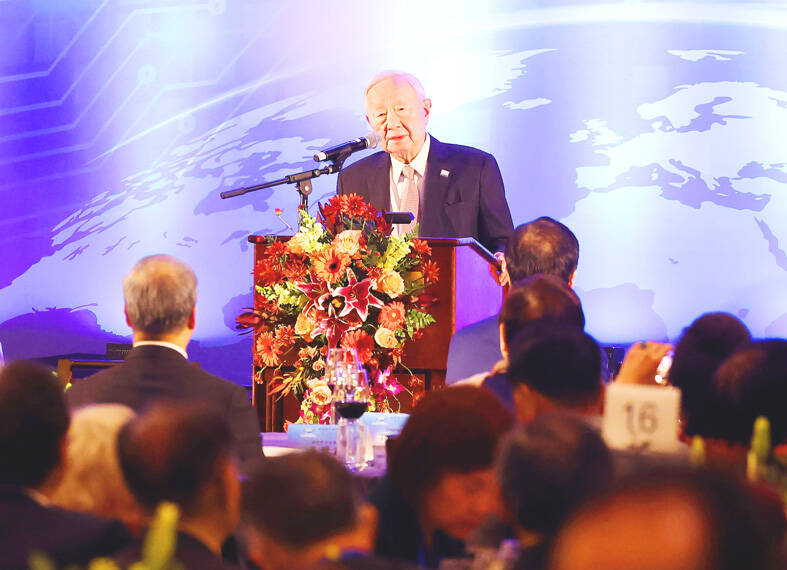Taiwan Semiconductor Manufacturing Co (台積電) founder Morris Chang (張忠謀), who is representing Taiwan at the APEC summit in San Francisco, on Friday said he hoped that the meeting between US President Joe Biden and Chinese President Xi Jinping (習近平) helps reduce tensions between the two superpowers and in the region.
The meeting could also promote economic stability and reliable supply chains, Chang said.
“You don’t have to be a leader to know that if there is no peace, there is no supply chain to start with,” Chang told a news conference at the close of the APEC summit.

Photo: CNA
Chang said the Biden-Xi meeting was a “good” one, pointing to their agreement to resume high-level military communications.
“It should help reduce the tensions between the US and China, and it should increase stability of Taiwan Strait,” Chang said.
Tensions have flared in the past few years as Beijing increases military pressure on Taiwan.
It was a high priority when Xi and Biden met for four hours on Wednesday at an estate outside San Francisco in their first face-to-face meeting in a year.
Xi sought assurances from Biden that the US would not support Taiwanese independence and requested that Washington support China’s peaceful annexation of Taiwan.
Biden urged Xi to refrain from military exercises in and around the Taiwan Strait, adding that Washington remains unchanged in its policy toward Taiwan and that it opposes any unilateral changes to the “status quo” from either side.
At Friday’s news conference, Chang said that he had “many interactions” with Biden, but no formal talks, adding that he spoke with senior US officials, including US Vice President Kamala Harris, US Secretary of State Antony Blinken and White House National Economic Council Director Lael Brainard.
“My interactions with President Biden [were] of a social, in fact, I might say, humorous nature,” Chang said.
“With [US] Secretary of State Antony Blinken, I mainly conveyed our strong desire for regional peace and prosperity, and also to some extent our very strong desire for increasing the supply resiliency,” he said.
Chang said he also had discussions with at least half of the leaders of the 21 economies in the region on issues such as regional peace, economic development and supply chains, but that he did not have any exchanges with Xi.
Chang, representing President Tsai Ing-wen (蔡英文) at the APEC summit for the seventh time, said Tsai tasked him with sending the message to APEC that Taiwan is committed to regional peace and prosperity, and that it would work with its partners to control climate change, build more resilient supply chains and reduce the digital divide.
“I think I’ve done it — that I tried my best to convey the four messages,” Chang said.
The 92-year-old first attended the annual APEC event in that role in 2006, during the administration of then-president Chen Shui-bian (陳水扁). Taiwan joined APEC in 1991 under the name “Chinese Taipei,” but its presidents have been blocked by China from attending its leaders’ summit.

NATIONAL SECURITY THREAT: An official said that Guan Guan’s comments had gone beyond the threshold of free speech, as she advocated for the destruction of the ROC China-born media influencer Guan Guan’s (關關) residency permit has been revoked for repeatedly posting pro-China content that threatens national security, the National Immigration Agency said yesterday. Guan Guan has said many controversial things in her videos posted to Douyin (抖音), including “the red flag will soon be painted all over Taiwan” and “Taiwan is an inseparable part of China,” while expressing hope for expedited “reunification.” The agency received multiple reports alleging that Guan Guan had advocated for armed reunification last year. After investigating, the agency last month issued a notice requiring her to appear and account for her actions. Guan Guan appeared as required,

A strong cold air mass is expected to arrive tonight, bringing a change in weather and a drop in temperature, the Central Weather Administration (CWA) said. The coldest time would be early on Thursday morning, with temperatures in some areas dipping as low as 8°C, it said. Daytime highs yesterday were 22°C to 24°C in northern and eastern Taiwan, and about 25°C to 28°C in the central and southern regions, it said. However, nighttime lows would dip to about 15°C to 16°C in central and northern Taiwan as well as the northeast, and 17°C to 19°C elsewhere, it said. Tropical Storm Nokaen, currently

PAPERS, PLEASE: The gang exploited the high value of the passports, selling them at inflated prices to Chinese buyers, who would treat them as ‘invisibility cloaks’ The Yilan District Court has handed four members of a syndicate prison terms ranging from one year and two months to two years and two months for their involvement in a scheme to purchase Taiwanese passports and resell them abroad at a massive markup. A Chinese human smuggling syndicate purchased Taiwanese passports through local criminal networks, exploiting the passports’ visa-free travel privileges to turn a profit of more than 20 times the original price, the court said. Such criminal organizations enable people to impersonate Taiwanese when entering and exiting Taiwan and other countries, undermining social order and the credibility of the nation’s

‘SALAMI-SLICING’: Beijing’s ‘gray zone’ tactics around the Pratas Islands have been slowly intensifying, with the PLA testing Taiwan’s responses and limits, an expert said The Ministry of National Defense yesterday condemned an intrusion by a Chinese drone into the airspace of the Pratas Islands (Dongsha Islands, 東沙群島) as a serious disruption of regional peace. The ministry said it detected the Chinese surveillance and reconnaissance drone entering the southwestern parts of Taiwan’s air defense identification zone early yesterday, and it approached the Pratas Islands at 5:41am. The ministry said it immediately notified the garrison stationed in the area to enhance aerial surveillance and alert levels, and the drone was detected in the islands’ territorial airspace at 5:44am, maintaining an altitude outside the effective range of air-defense weaponry. Following